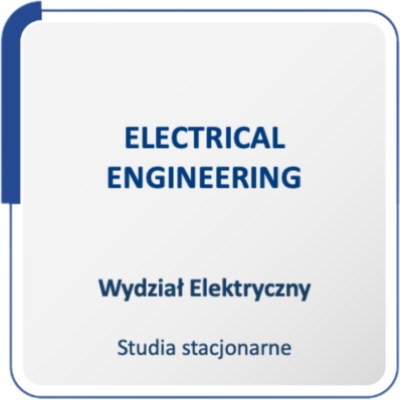- Opis
- Dodatkowe informacje
Opis
Electrical engineering
| Mode of study | Title obtained | Period of study | Language of instruction | Place of classes | Minimum number of credits (Polish students) | Admission limit | Points to guarantee admission |
|---|---|---|---|---|---|---|---|
| Full-time | Bachelor of Science (Inżynier) |
3,5 years / 7 semesters |
English | Gliwice | 60 out of 150 max. | 40 | 85 |
Faculty of Electrical Engineering
Gliwice, 2 Bolesława Krzywoustego St.
phone: 32 237 17 80
e-mail: we_rekrutacja@polsl.pl
Today’s world was created thanks to universal access to electricity. Electrical Engineering is the knowledge of how electricity is produced, transmitted, converted and used. The world of tomorrow will only be created thanks to electrical engineering. Electrical Engineering is your knowledge of technologies related to power plants, renewable energy sources, service industry and industrial production, control and programming. We will teach you how to design, operate, supervise, service, build and protect everything that uses electricity. We have been doing this successfully since 1945.
Our graduates of Electrical Engineering, as engineers, have the greatest employment opportunities and are not in danger of having to change their profession for the rest of their lives. Studying Electrical Engineering will give you a job in any branch of industry or services, because electricity is used in every area of production, so its constant supply and protection are necessary. Many employers do not wait for graduates of Electrical Engineering, but offer our students a job during studies. The future is new technologies and new applications of electricity, which poses new challenges for engineers. There will be more and more interesting jobs connected with our course.
Graduates of Electrical Engineering:
- have knowledge in the field of electrical engineering, power engineering, power electronics, measurements in industry, automation and programming, robotics, analog and digital electronics, operation of electrical systems, electric vehicles, energy accumulation,
- have skills in the field of designing, constructing, building and operating devices, electrical machines, power systems, including intelligent ones, and know how to protect electrical systems, machines and installations in various fields of modern industry,
- they learn the principles of organization and economics of production, operation and management.
Each of our diploma paths will prepare you for work in the industry. Each of our students undergoes professional practice. You can participate in numerous industrial internships. Our partners include: Polskie Sieci Elektroenergetyczne S.A., TAURON Polska Energia S.A., Stellantis, APA Group, Rockwell Automation, Aiut, Electroinstal. Thanks to the high competences of our students, the completed internships often become a pass for their further cooperation with the above-mentioned companies.
Graduates of Electrical Engineering are prepared to independently conduct study projects, design, engineering and organizational work. They have the competence to occupy managerial positions. They can also work in scientific institutes. Graduates of Electrical Engineering are the most sought-after and well-paid specialists on the market. There are jobs waiting for them in traditional and renewable energy, all branches of industry, numerous Polish and foreign enterprises.
Graduating from Electrical Engineering allows you to obtain building qualifications in the installation specialty in the field of electrical and power networks, installations and devices. In addition, it is possible to obtain additional qualification certificates entitling to operate and supervise equipment, installations and power networks. These advantages mean that a wide range of professional opportunities appears before the graduate.
Graduates of the field find employment both in Poland and abroad. Many of them hold managerial positions. As part of the cooperation of the Faculty of Electrical Engineering of the Silesian University of Technology and the research tasks carried out, we meet many of our graduates who are leaders of their companies. A natural consequence of completing first-cycle studies is the continuation of education at second-cycle studies, which proves the attractiveness of this field of study.
“I started this course with fear, I didn’t know if I could handle it. I do not regret! Now I can develop professionally. During my studies, I met many people with whom I now work and develop. I recommend!”
“I wanted to continue family traditions, everyone motivated me. They were right! Our company is thriving, and the technologies and solutions learned by me during the studies allowed for the development of the business profile.”
Qualification is based on the results of the written parts of the matura exam.
P = 0,5 × Wmp + k × Wadditional
where:
P – number of points in the qualification process,
Wmp – number of points (%) obtained in mathematics (basic level),
Wadditional – number of points (%) obtained in one additional subject (mathematics – advanced level, biology, chemistry, physics, computer science) or the result of vocational exams in a profession taught at the technician level,
k = 0.5 for the basic level,
k = 1 for the advanced level,
k = 0.7 for the result of vocational exams in a profession taught at the technician level.
Points are calculated using the subjects where the candidate scored the highest. If a subject wasn’t taken at a required level, it is counted as 0 points in the final calculation.
Full admission criteria, including those for applicants qualifying on a basis other than the matura exam (nowa matura) and the list of recognized technician-level professions, are available on a separate page.
Dodatkowe informacje
| Tytuł | inżynier |
|---|---|
| Stopien | Stopień I |
| Forma | Stacjonarne |
| Język | Angielski |
| Kierunek | Electrical engineering |
| Miasto | Gliwice |
| Profil | ogólnoakademicki |
| Rekrutacja | Pokaż |
| Wydział | Wydział Elektryczny |





